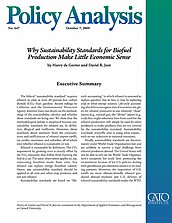Ethanol is sustainable by definition. The CO2 sequestered by growing corn is exactly offset by the CO2 emissions that follow from burning the fuel in a car. The same observation applies to, say, consuming bourbon made from corn, but ethanol can replace energy — bourbon cannot. Hence, any sustainability standard should be applied to all corn and other crop products, and not just ethanol.
Sustainability standards are based on “lifecycle accounting,” in which ethanol is assumed to replace gasoline; but in fact, it may be replacing coal or other energy sources. Life-cycle accounting also fails to recognize that if incentives are given for ethanol producers to use relatively “clean” inputs (e.g., natural gas), the “dirtier” inputs (e.g., coal) that might otherwise have been used for the ethanol production will simply be used by other producers to make products that are not covered by the sustainability standard. Sustainability standards reshuffle who is using what inputs — with no net reduction in national emissions.
Finally, sustainability standards are discriminatory under World Trade Organization law and are unlikely to survive a legal challenge from ethanol producers abroad. The United States will not be able to rely on the World Trade Organization’s exception for trade laws protecting the environment because of lax U.S. policies dealing with greenhouse gas emissions relative to its trading partners. Moreover, the imposition of U.S. tariffs on more climate-friendly ethanol produced abroad weakens any U.S. defense of ethanol sustainability standards under the WTO.

